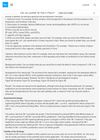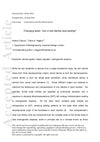 May 2014 in “JAMA Dermatology”
May 2014 in “JAMA Dermatology” Mother and son diagnosed with a rare genetic hair loss condition with no effective treatment.
 June 2011 in “Expert Review of Dermatology”
June 2011 in “Expert Review of Dermatology” Researchers discovered potential origins and new treatments for skin cancer, including biomarkers for melanoma and therapies that reduce tumor growth.
 October 2010 in “International Journal of Dermatology”
October 2010 in “International Journal of Dermatology” An 86-year-old man with prostate cancer was diagnosed with a rare, low-grade breast cancer and underwent surgery but declined additional hormone therapy.
 June 2010 in “Expert Review of Dermatology”
June 2010 in “Expert Review of Dermatology” Scientists found key proteins and genes that affect skin and hair health, and identified potential new treatments for hair loss, skin disorders, and wound healing.
 February 2024 in “Frontiers in plant science”
February 2024 in “Frontiers in plant science” Peps help Arabidopsis plants grow more root hairs by affecting specific genes and calcium signaling.
 September 2022 in “Frontiers in genetics”
September 2022 in “Frontiers in genetics” A Chinese male with a new genetic mutation has a skin condition and severe urinary issues, with treatments having mixed success.
 November 2018 in “The Journal of Allergy and Clinical Immunology: In Practice”
November 2018 in “The Journal of Allergy and Clinical Immunology: In Practice” Using old drugs for new uses can help treat rare immune deficiencies.
 121 citations,
November 2020 in “Endocrine”
121 citations,
November 2020 in “Endocrine” Male hormones like testosterone may make COVID-19 worse, and testing for sensitivity to these hormones could help predict how severe a patient's symptoms might be. Treatments that reduce these hormones are being explored.
 65 citations,
September 2010 in “Journal of the Neurological Sciences”
65 citations,
September 2010 in “Journal of the Neurological Sciences” Kennedy's disease leads to muscle weakness and sensory issues, has no cure but manageable symptoms, and future treatments look promising.
 51 citations,
January 2012 in “Annals of Dermatology”
51 citations,
January 2012 in “Annals of Dermatology” Asian hair loss differs from Europeans; consider individual needs and psychological well-being for treatment.
 47 citations,
August 2000 in “Endocrine Reviews”
47 citations,
August 2000 in “Endocrine Reviews” The document concludes that more research is needed to understand excessive hair growth in women with normal hormone levels and regular ovulation.
37 citations,
April 2018 in “Journal of Allergy and Clinical Immunology” A mutation in the IKZF1 gene causes immune system overactivity, linked to autoimmune diseases like lupus.
 13 citations,
November 2010 in “Experimental Dermatology”
13 citations,
November 2010 in “Experimental Dermatology” Vitamin C derivative reduces hair loss-related protein in cells.
 9 citations,
April 2023 in “Frontiers in immunology”
9 citations,
April 2023 in “Frontiers in immunology” New technologies help us better understand how skin microbes affect skin diseases.
 6 citations,
July 2013 in “Acta Clinica Belgica”
6 citations,
July 2013 in “Acta Clinica Belgica” The document concludes that combination therapy is most effective for treating excessive hair growth in women with idiopathic hirsutism, and more research is needed to understand the condition.
 2 citations,
January 2020 in “International Journal of Cosmetic Science”
2 citations,
January 2020 in “International Journal of Cosmetic Science” Niacinamide does not promote hair growth.
 1 citations,
January 2019 in “Springer eBooks”
1 citations,
January 2019 in “Springer eBooks” Hidradenitis Suppurativa is a chronic skin condition best treated early with surgery for better outcomes and less recurrence.
Editing the FGF5 gene in sheep increases fine wool growth.

VB-1, a natural compound, may promote hair growth by enhancing important cell signaling and increasing key gene expression.
 May 2015 in “Endocrinología y nutrición”
May 2015 in “Endocrinología y nutrición” The conclusion is that adult males with muscle weakness and hormonal imbalances should be tested for Kennedy's disease.
 June 2016 in “Experimental Dermatology”
June 2016 in “Experimental Dermatology” Changing hair follicle identity could potentially reverse balding.
February 2024 in “Epigenomes” Epigenetic mechanisms control skin development by regulating gene expression.
 August 2023 in “International Journal of Molecular Sciences”
August 2023 in “International Journal of Molecular Sciences” Liposomes show promise for delivering CRISPR for gene editing but face challenges like delivery efficiency and safety concerns.
9 citations,
January 2014 in “Molecular Genetics and Metabolism Reports” The rhg mutation in mice affects the Oat gene, causing hair growth issues and other symptoms.
 1 citations,
April 2023 in “International Journal of Molecular Sciences”
1 citations,
April 2023 in “International Journal of Molecular Sciences” Botryococcus terribilis Ethanol Extract may reduce inflammation by changing gene expression in cells.
 July 2002 in “Australasian Journal of Dermatology”
July 2002 in “Australasian Journal of Dermatology” Maintaining anticoagulation is crucial for patients with antiphospholipid syndrome.
 21 citations,
December 2016 in “PLOS ONE”
21 citations,
December 2016 in “PLOS ONE” Scientists made skin stem cells from other human cells with over 97% efficiency, which could help treat skin conditions.
 9 citations,
April 2019 in “Molecules”
9 citations,
April 2019 in “Molecules” Blackcurrant extract may help reduce hair loss by promoting stem cell activity in hair follicles.
 9 citations,
May 2012 in “PLOS ONE”
9 citations,
May 2012 in “PLOS ONE” ILK is essential for skin development, pigmentation, and healing.
 8 citations,
May 2018 in “The Journal of Allergy and Clinical Immunology”
8 citations,
May 2018 in “The Journal of Allergy and Clinical Immunology” Activating the Nrf2 pathway reduces inflammation and cell activation in human hair follicles, suggesting a potential treatment for certain hair loss conditions.


























